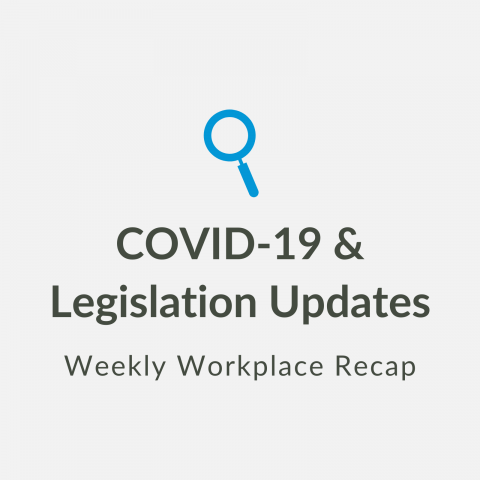COVID-19 & Legislation Updates | Weekly Workplace Recap from October 1 to October 7, 2021

Below are the key COVID-19 & legislation topics that touch on the workplace from October 1 to October 7, 2021.
Ontario
Ontario's minimum wage goes up by a dime - here's why
Effective October 1, the minimum wage in Ontario will go up by 10 cents, an increase that some have deemed irrelevant and an insult amid surging costs of living, according to media reports. However, this salary increase merely follows the enforcement of the province's Bill 47, Making Ontario Open for Business Act, 2018. The implementation of the act initially froze minimum wage at $14 until October 1, 2020. After that however, minimum wage will be subject to an annual inflation adjustment.
Ontario WSIB plans to cut premium rates for businesses by $168 million
Ontario’s Workplace Safety and Insurance Board (WSIB) is cutting premium rates in 2022 by $168 million, bringing the total reduction in premiums since 2018 to $2.4 billion.
In addition, the government is intending to introduce legislation that, if passed, would allow for a significant portion of the WSIB’s current reserve, currently valued at $6.1 billion, to be distributed to safe employers.
Ontario government posted several new bills
A number of new Bills went through first reading carried by the Ontario Government recently:
-
Bill 7, 10 Paid Sick Days for Ontario Workers Act, 2021. Amends various sections of the Employment Standards Act, 2000. Comes into force on the day it receives Royal Assent.
-
Bill 6, Jobs and Jabs Act, 2021. Amends the Employment Standards Act, 2000 – An Act to amend the Employment Standards Act, 2000 with respect to reprisals respecting the vaccination status of employees. In force September 1, 2021.
-
Bill 4, Long-Term Care Commission's Recommendations Reporting Act, 2021. Amends the Long-Term Care Homes Act, 2007 to require the Minister of Health to make progress reports describing the extent to which the Ministry has implemented the recommendations made in the final report issued by Ontario’s Long-Term Care COVID-19 Commission. Comes into force on the day it receives Royal Assent.
-
Bill 3, Stopping Anti-Public Health Harassment Act, 2021. The Act prohibits persons from engaging in harassing behaviours while in a safe zone established by the regulations. Comes into force on the day it receives Royal Assent.
-
Bill 2, Creating Safe Zones around Hospitals, Other Health Facilities, Schools and Child Care Centres Act, 2021. The Act creates safe zones around hospitals, other health facilities, schools and child care centres. Protests against COVID-19 vaccinations or against other public health measures, and related actions, are prohibited in these safe zones. Subject to subsection (2), this Act comes into force on the day it receives Royal Assent.
British Columbia
Former restaurant worker wins $30,000 in pronoun discrimination case
A former restaurant worker has won $30,000 in a discrimination case against their previous employer in British Columbia. The BC Human Rights Tribunal has found that a colleague and owners of the restaurant where Jessie Nelson previously worked, discriminated against them in the workplace.
Mandatory Vaccinations
This topic now has its own section as the topic heats up and the list of employers who announce mandatory Covid-19 vaccinations grows.
Employers announcing Mandated Vaccination
Mandatory COVID-19 vaccination requirements for federally regulated transportation employees and travellers
As of October 30, the Government of Canada will require employers in the federally regulated air, rail and marine transportation sectors to establish vaccination policies for their employees. Also effective October 30, travellers departing from Canadian airports, and travellers on VIA Rail and Rocky Mountaineer trains, will be required to be fully vaccinated in order to travel.
Ontario religious groups require proof of COVID-19 vaccine from staff at places of worship
Several Ontario religious organizations are requiring staff and volunteers at places of worship to be fully vaccinated against COVID-19 while encouraging members of their congregations to get their shots.
City of Toronto provides update on mandatory vaccination policy for City staff
As of October 5, 26,138 members of the Toronto Public Service are fully vaccinated, which is 89% of City staff who disclosed their COVID-19 vaccination status. 5% of City staff who disclosed their vaccination status are partially vaccinated and 2% chose not to disclose their vaccination status.
Ontario makes it mandatory for long-term care staff, volunteers to be fully vaccinated against COVID-19 by November 15
COVID-19 vaccinations will be mandatory for all in-home staff, support workers, students, and volunteers by November 15, 2021, unless a staff member has a valid medical exemption, as well as expanded inspections of homes and redirecting provincial resources to enhance and audit existing testing in homes.
Vaccinations will be required for teachers, school staff and volunteers at Edmonton Public Schools
All school staff, contractors and volunteers at Edmonton's 215 public schools will have to be fully vaccinated or provide proof of negative COVID-19 tests.The mandatory vaccination initiative will be phased in between mid-October and December 17.
New vaccination policy for Alberta Public Servants
The Government of Alberta is implementing a proof of COVID-19 vaccination policy for all Alberta Public Service employees. Employees will have until November 30 to submit proof of full vaccination.
COVID-19 vaccines to be mandatory for all public service employees in B.C.
The BC Public Service Agency, in consultation with the provincial health officer, will require its 30,000 employees to be fully vaccinated by November 22, 2021.


